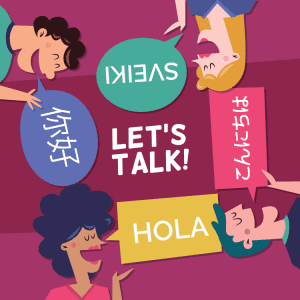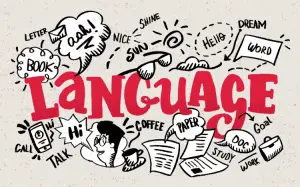Communication is an essential part of our daily lives. We ourselves communicate,
and others communicate to us through words, but also through gestures, facial
expressions, body language, writings, texts, media, etc.
Especially today, in an age of technology and instant communication, more than ever people are sharing what they think and saying what they want when they want with the most liberty.
It’s understandable why you would look for synonyms, or other ways of saying, the
word “said”, or “says”. “Said” is the past-tense of “says”. So, we would use it if we are recalling or repeating something someone said at a previous time.
For example:
- “My doctor said my health has been improving over the last few
weeks.”
To use “said”, means someone was speaking, or talking. Of course, we know
there are various ways of speaking, right?
We could SHOUT! We could whisper… We could speak, loud, low, fast, slow, carefully, carelessly, angrily, lovingly, and the list goes on, and there is a way of describing each and every type of manner spoken.
“Said” is more general. It means the words were spoken or
declared. Below are a few synonyms you could use for “said” as well as examples of how you can add some descriptors.
Say
To speak words.
Said
Words spoken in the past.
Most common synonyms for SAID
Declared
 Something said with certainty and conviction.
Something said with certainty and conviction.
- The politician passionately declared the changes he promised to bring about.
- I declared I would have to move out of my flat by the end of the month.
Disclosed
To share secret information.
- I felt our friendship tighten, when Ana disclosed this personal experience
with me. - The journalist only said she would not reveal who disclosed the confidential
story to her.
Discussed
To talk about something with others.
- We were both angry, but we discussed the matter in a cordial and polite
manner. - I’ve discussed music and literature more times than I can remember in this
famous jazz club.
Chatted
To casually talk with others.
- We chatted over coffee and pastries during our work break.
- I love the way my dad chats with me when we have time to spend together.
Communicated
To share information.
- I communicated my personal opinions to my manager about how this
department was running. - My boyfriend communicated his sincere admiration for my determination when I completed my first running marathon.
Mentioned
To say or refer to something briefly.
- I was surprised my mom didn’t mention how dirty my flat was when she
came to visit. - She tried not to mention how much she missed her family during the
holidays, because it would only maker her more homesick.
Voiced
To share an opinion or attitude.
- The student voiced his opinion of how unfair the teacher was managing the
class. - The citizens voiced their extreme dissatisfaction with the local government
through protests.
There are actually plenty of words that describe someone saying words. Depending on the tone and emotion that each of them feel, you can pull from each of these short lists to find a word that suits your needs:
Words to use INSTEAD of Said
When the Speaker is Happy
Rejoiced
 When someone is happy about something, they rejoice. This is a stronger word than simply saying they are happy.
When someone is happy about something, they rejoice. This is a stronger word than simply saying they are happy.
- “Now, we can FINALLY enjoy the party,” rejoiced the bride, who had been planning the wedding ceremony for months.
- “I honestly can’t believe that we pulled it off,” rejoiced the teachers.
Celebrated
When there is something specifically good that happens, you can celebrate!
- “I am so happy for your promotion!” celebrated Winston.
- “This definitely calls for some champagne,” celebrated Pauline.
Laughed
When someone is making a joke, or trying to get someone else to laugh, you can use this.
- “I can’t believe you fell for that trick!” laughed Derek
- “You thought what?! No, he is my brother and not my boyfriend!” laughed Susan.
Chuckled
Chuckled is a synonym for laughed, but is a smaller laugh. If you chuckle, something is slightly funny but does not make you roll on the floor with laughter.
- “Yeah, I thought that you might find it funny,” chuckled Sam.
- Diane chuckled, “That was why you were trying to avoid him this whole time?”
Joked
When someone says something that is not serious, you can say that they joke about a topic.
- “Maybe we should get married tonight,” joked Tommy, whose girlfriend thought he was completely serious.
- She joked, “Perhaps your dreams would actually happen if they were actually important to you.”
Beamed
To beam means to have a giant smile on your face. If you beam when you say something, it means that you are extremely happy that it happened and you are glad to show it to everyone.
- “I have some great news,” the man beamed. “My wife is pregnant!”
- “Son, I am so proud of you,” George’s father beamed.
Marveled
To marvel at something means to admire it a lot. If you are marveling, you are looking at something that you think deserves a lot of praise. It often is something that captures your attention like nothing else!
- “These chocolate chip cookies are the best that I have ever tasted!” marveled the boy.
- “The view from the top of Machu Picchu is simply incredible; it has got to be one of the most beautiful views in the world!” marveled Rebecca.
Cheered
When you cheer about something, it means that you are celebrating it. You yell in joy because you are happy, often because something turned out the way that you had hope. A good situation in which you would use this is if you win a sports match that you really wanted to win. Or, you can cheer if you watch your favorite team win!
- “This now proves our team is the best!” cheered Uncle Dave.
- “If you keep this up, I am sure our company will continue to grow,” cheered the CEO.
Sang
While most of the time sang is used in the context of singing a song, it is not always. You can use sang if there is a song or tune involved. However, it can also help show a speaker’s emotion. If someone is saying something in a singing way, this means that they are very excited.
Imagine a little girl skipping down a road, singing something to herself – showing that she is very happy. If someone sings a sentence, it means they feel very excited and want to show that emotion off.
- “It is the end of the school year! Summer vacation, here I come!” sang Jenny.
- “I just can’t believe I am getting married today!” sang the bride to be as she picked up her wedding dress.
Giggled
To giggle means to laugh lightly. Most of the time, the laugher is a bit embarrassed to laugh but thinks something is too funny not to giggle.
- “Who thought that Bobby would be the last one to cross the river?” giggled the students.
- “The panda baby that is trying to get its mother’s attention is absolutely adorable,” giggled Brian.
Gloated
To gloat means to show off. When you are proud of something that you did and want everyone to know, you can gloat. Usually, gloat means that you will cause other people to be frustrated.
- “Even though I study much less than you, I still got a better grade!” gloated Fred.
When the Speaker is Worried
Gulped
 When someone visibly swallows before they say something, they gulp.
When someone visibly swallows before they say something, they gulp.
- “I really do not think I am the best person to give this presentation,” gulped Thomas.
Stuttered
When someone is unable to say words smoothly, and it feels like they have words stuck in their throat, they stutter.
- “W…w…what did you w…want?” stuttered Lily.
Whispered
To whisper means to say something very quietly, trying not to be heard by anyone else.
- “Can you tell me the plan again?” whispered Ryan.
Trembled
When someone trembles, it means that they are visibly shaking. They cannot control their emotions and are very frightened or nervous.
- “Does anyone else see that tiger over there?” trembled Amy.
When the Speaker Will Not Change Their Mind
 Commanded
Commanded
When you think of an army general, or an angry mom, they speak in commands.
- “Why are these tasks not yet finished?!” commanded the project leader.
Insisted
To insist means to be convinced that you are right, even if you are not.
- “I am sure that I was the last employee to leave on Friday night,” insisted Peggy.
Dictated
To dictate means to give an order than must be obeyed.
- “I want all these toys cleaned up from the floor by the time that I get home!” dictated father.
Demanded
When you demand something, you are authoritatively asking someone to do something.
- “I ordered strawberry, not peach. Switch this out right away!” demanded the young man.
Ordered
Ordering someone around means to ask for something to be done right away, and not allow someone to deny you.
- “Three day delivery is unacceptable; I need this here tomorrow!” ordered the operations supervisor.
When the Speaker is Sad
 Whined
Whined
A baby whines when they do not get what they want. You can whine when you are complaining about something.
- “This hike took way longer than I expected, and I am tired,” whined Francis.
Bawled
To bawl is to cry very loudly and very hard.
- “I do not want to go to bed yet,” bawled Catherine.
Groaned
To groan means to make a sound of protest against someone’s wishes. It is like a sigh, but it is much more obvious that the speaker is displeased.
- “I can’t believe mom is making us take out the trash AGAIN,” groaned Christian.
Sobbed
To sob also means to cry, but is usually a heavier crying. It is often in response to an unfortunate thing happening.
- “Even though the doctors told us mom did not have long to live, her death still was a shock,” sobbed the daughter.
Cried
When someone is crying, you can describe their speech that way.
- “But mom, I want to eat a lollipop!” cried the baby boy.
When the Speaker is Angry
 Roared
Roared
A lion may roar, indicating that they are very loud and about to attack.
- “WHO STOLE MY COFFEE?!” roared the man.
Bellowed
To bellow means to speak very loudly. Usually it means that the person has a deep voice that is trying to be heard everywhere.
- “Anyone who has a ticket for the next flight should go to the ticket check now,” bellowed the voice over the loud speaker.
Grunted
Grunting is a low, guttural sound that usually can remind you of an animal.
Ranted
To rant means to talk about something nonstop. Typically, you are angry about something and want to express all your thoughts to someone.
Barked
Like a dog, barking something means to shout it sharply.
Sneered
To sneer means to make an angry and deriding face at someone.
Snapped
To snap is like snapping something closed; you quickly blurt out something because you are angry.
Thundered
Someone who speaks like this sounds like thunder: very loud and annoyed.
Fumed
To fume means to be so mad you can see flames or smoke coming off the top of your head.
Hissed
To hiss is make a sound like a snake (lots of s’s), usually in a low, angry tone.
- “I thought you would take care of this problem!” hissed Steve.
When the Speaker is Quiet
 Whispered
Whispered
- “This is probably something that has been bothering them for quite a while, and they are very glad to have the burden lifted from them,” whispered Brendon.
Muttered
This means to talk under your breath about something.
Mumbled
This means to speak so softly you do not say things clearly.
Murmured
To murmur means to speak very quietly, often in a way that others can’t understand.
Breathed
This if often used for people speaking when they are out of breath, but people can be mesmerized also by something amazing.
When the Speaker is Loud
 Boomed
Boomed
This typically describes a loud, deep voice that comes in from a loud speaker or announcer.
Belted
To belt out something means to speak it very loudly, especially in a singing way. You can belt out a song when you sing as loud as you can.
More: Shouted, Yelled, Screamed, Exclaimed, Announced, Called.
When the Speaker has a Question or Request
Inquired
To inquire means to ask about something in a formal setting. You often look for someone in charge or who has a lots of experience, such as a hotel concierge.
More: Asked, Requested, Wondered, Begged, Pleaded
When the Speaker has an Answer
Answered, Explained, Responded, Replied, Acknowledged, Lied, Challenged, Conjected, Guessed, Reasoned
When you are writing a story, whether it is fiction or nonfiction, you will probably include a lot of quotes. Quotes are direct when you write down the exact words that someone says. By including words that someone actually said, you can allow the reader or listener to better understand what that person meant.
The problem with that is that using the same words can become boring very quickly. If you only describe the person as “saying” something, it does not convey their emotion when they said it.
In English, this kind of context can be very important. Instead of saying that someone simply said it, they might shout it, whisper it, question it, or ask it. This can give you a sense of how they are feeling, and what it means when they are discussing something.

























I really appreciate your work. Thank you very much.
Great work.
Thank you so much!